We may not have the course you’re looking for. If you enquire or give us a call on +44 1344 203 999 and speak to our training experts, we may still be able to help with your training requirements.
Training Outcomes Within Your Budget!
We ensure quality, budget-alignment, and timely delivery by our expert instructors.
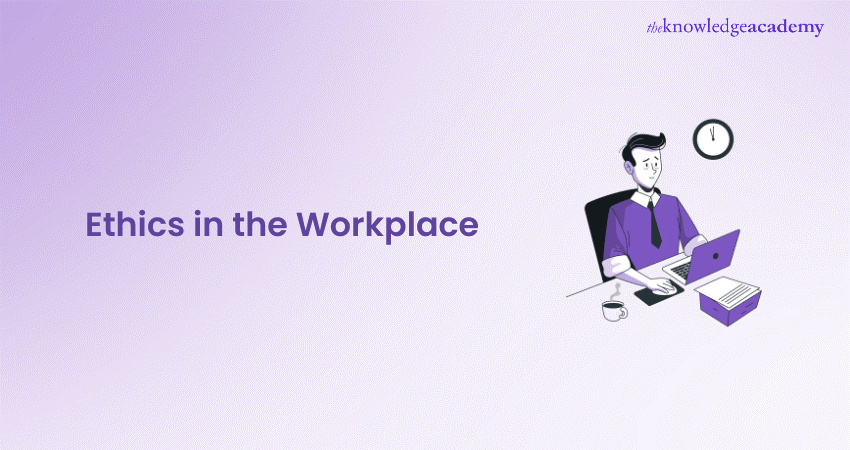
Moral and ethical dilemmas are an inseparable part of modern business life, shaping the way we interact, make decisions, and lead. At the heart of every successful organisation lies Workplace Ethics, pumping the lifeblood of trust, respect, and fairness. Without strong ethical principles, even the most talented teams can falter, leading to a toxic work culture where trust breaks down and collaboration is stifled.
But what exactly are Workplace Ethics, and why are they so crucial to a thriving business? While many organisations understand the importance of following laws and regulations, ethics in the workplace go beyond Compliance. In this blog, we will explore the importance of ethics in the workplace, the stark differences between strong ethical practices and unethical behaviour, and how businesses can promote a culture of integrity.
Table of Contents
1) What are Ethics in the Workplace?
2) Why is Ethics in the Workplace Important?
3) Examples of Ethical Behaviour in the Workplace
4) The Impact of Ethics on Organisations
5) Benefits of Upholding Ethics in the Workplace
6) Strong Ethics vs Unethical Behaviour in the Workplace
7) Conclusion
What are Ethics in the Workplace?
Ethics in the workplace refer to the moral principles that guide behaviour and Decision-Making in a professional environment. These principles are the backbone of a respectful, fair, and honest workplace. They help create an environment where employees feel safe and valued, and where businesses operate transparently and responsibly. Ethical guidelines cover a range of areas including honesty, accountability, respect, and fairness, and apply to every level of an organisation, from interns to executives.
In simple words, Workplace Ethics is how people should treat each other, as well as the way they must behave at work. A company thrives due to mutual trust among workers, management, and clients with high ethical standards.
Why is Ethics in the Workplace Important?
Workplace Ethics are important for several reasons.
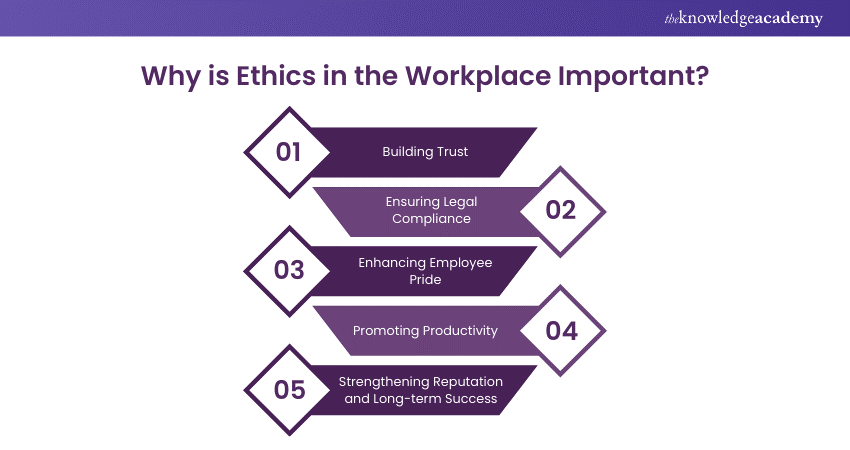
1) Building Trust: Ethics help build trust in business relationships. Employees and customers feel secure when they witness honesty and integrity in the company’s practices.
2) Ensuring Legal Compliance: Ethical practices ensure that the organisation meets legal standards, reducing the risk of lawsuits and regulatory penalties.
3) Enhancing Employee Pride: Employees take pride in working for ethical organisations, where fairness is upheld, and unethical behaviour like dishonesty or discrimination is not tolerated.
4) Promoting Productivity: A secure, ethical environment encourages Effective Communication, idea-sharing, and collaboration, resulting in increased productivity without fear of retaliation.
5) Strengthening Reputation and Long-term Success: Ethical behaviour enhances an organisation’s reputation and contributes to long-term success, fostering loyalty from both employees and customers.
Examples of Ethical Behaviour in the Workplace
Ethical behaviour in the workplace forms the foundation of a positive and productive environment. By upholding integrity and accountability, employees contribute to a culture of trust, fairness, and mutual respect, which benefits both the organisation and its people. Here are a few examples of ethical behaviour in the workplace:
1) Accountability
This is taking responsibility over one's work form a primary set of ethics in handling affairs. Where the employees take accountability to their work whether in mistakes or success it further implies the culture of ownership. This means that responsibility will mean all the job executions with integrity where the employees are sincere about facing the challenges and their mistakes.
2) Transparency
Although an open and honest workplace calls for transparency, whether it relates to business updates, explaining the Decision-Making Processes, or clearly giving feedback, transparency breeds trust within the team. Thus, this helps to avoid confusion and encourages every individual within the team to be on the same page, thereby creating a culture of openness and collaboration.
3) Speaking Up
One of the important ways to uphold integrity is by encouraging employees to express ethical concerns. Be it complaints against unethical behaviour at work or mere reservation against the practices being followed at the place of work, the freedom to express worries and concerns without any fear of retaliation gives an epitomised example of an ethical workplace. Leaders must, therefore, build open avenues for employees to communicate their grievances and ensure that the organisation remains accountable.
The Impact of Ethics on Organisations
The impact of ethics on organisations is profound, shaping the company’s culture, reputation, and long-term success. Here are a few impacts:
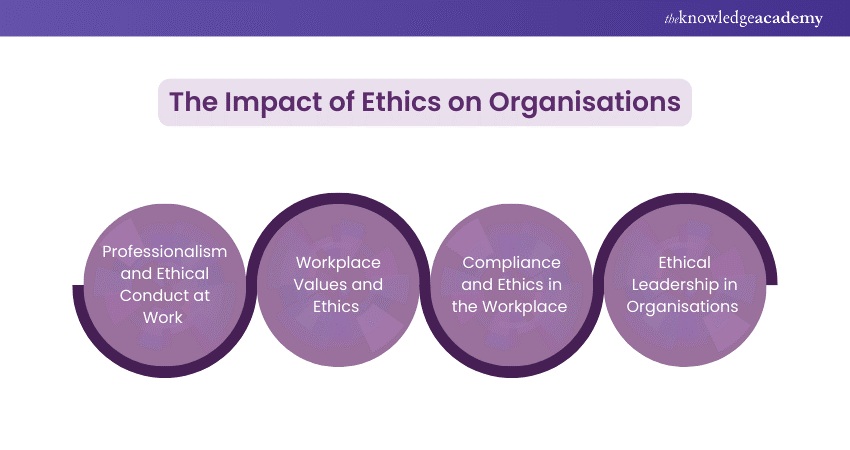
1) Professionalism and Ethical Conduct at Work
Professionalism is highly interlinked with ethics. Professionalism encompasses the way a person engages with others in relations with respect, reliability, and fairness, which goes hand in hand with ethical virtues. Professional employees uphold values and positively contribute to the work environment of the organisation.
2) Workplace Values and Ethics
Organisational values are the axioms under which employees operate and anchor the general culture. When a company's values are built on deep, solid ethical considerations, then the workplace will be one in which fairness, respect, and honesty are valued. This makes for better Employee Engagement and retention since workers will feel in sync with the core beliefs of the firm.
3) Compliance and Ethics in the Workplace
Compliance involves obeying the rules and regulations set for the conduct of business. Just like compliance adheres to all legal requirements that must be met, ethics take it a little further by guiding action towards moral values. Ethical conduct therefore ensures that organisations meet their legal needs but are managed in ways that benefit employees, customers, and the community.
4) Ethical Leadership in Organisations
Ethical leadership builds a space in an organisation where people can keep themselves truthful and honest within the firm. Role modelling by leaders calls for every other member of the organisation to lead their lives by the example shown to them. Ethical leaders seek to pursue transparency, equity, and accountability, so thus, there is encouragement and even rewarding of ethical behaviour. This motivates the workforce to act with integrity and act in ways that reflect the standards set by the ethics of the organisation.
Want to set new benchmarks for your business ethics goals? Register for our Ethics in Workplace Training - Join today.
Benefits of Upholding Ethics in the Workplace
Upholding ethics in the workplace not only fosters a positive and trustworthy environment but also drives long-term success. Some of the benefits of upholding ethics in the workplace are:
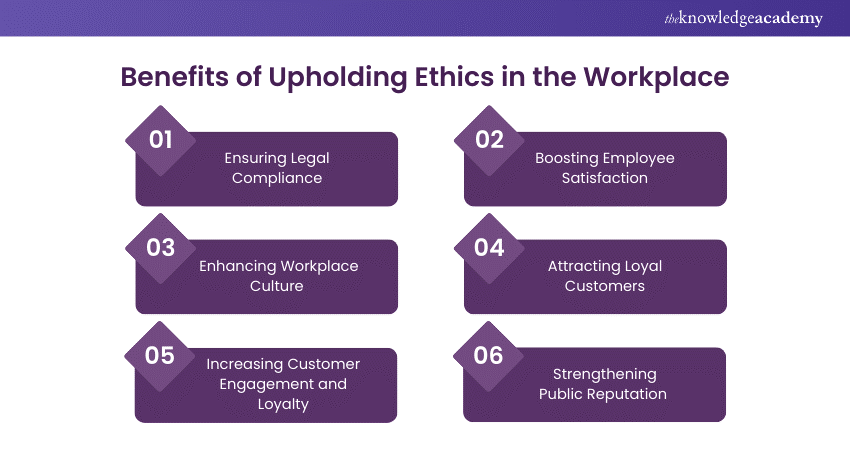
1) Ensuring Legal Compliance
Running afoul of the law and breaking regulations gets lower chances when firms conduct business ethically. Such occurrences may lead to hefty fines, expensive litigation, and lost reputation, and therefore lead to operational disruption.
2) Boosting Employee Satisfaction
There is a direct relationship between employee satisfaction and an ethical workplace. People at work will feel safer, appreciated, and inspired if their employer shows respect and fair dealings with everyone. A happy working environment leads to higher employee retention and loyalty.
3) Enhancing Workplace Culture
A positive and supporting culture emanates from strong Workplace Ethics. Knowing that one is working in a respectful and fair environment better lead to working together among employees. This creates teamwork, innovation, and overall happiness at the workplace.
4) Attracting Loyal Customers
Customers are attracted to the integrity and responsibility of business entities. A company insistent on ethical behaviour will engage in stronger, longer relationships with customers who want transparency and honesty.
5) Increasing Customer Engagement and Loyalty
When customers understand that a particular business ensures ethicality, they will remain engaged and loyal. A surety of customer's confidence for repeated return is provided by ethical conduct. Repeat business and long-term partnership are, therefore, ensured.
6) Strengthening Public Reputation
The reputation of an organisation is established on its ethical action. Such companies are reported to attract the best human resources, investors, and associates for them. A good public image of reliability also strengthens businesses at the time of crisis.
Strong Ethics vs Unethical Behaviour in the Workplace
The difference between strong ethics and unethical behaviour in the workplace can be stark. Ethical companies promote transparency, respect, and fairness, creating environments where employees and customers feel secure. Unethical behaviour, on the other hand, leads to distrust, low morale, and potentially damaging legal repercussions. Unethical practices may provide short-term gains, but they often result in long-term consequences that can devastate a business’s reputation and financial health.
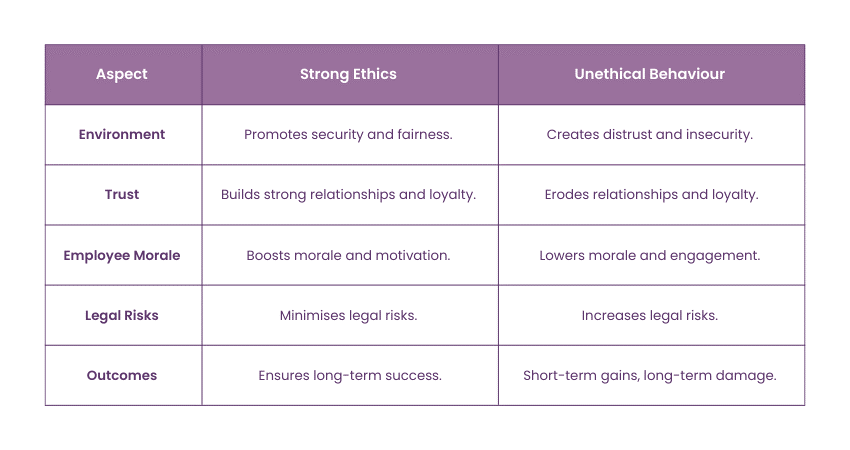
Businesses must actively work to foster ethical behaviour by setting clear guidelines, encouraging open communication, and holding everyone accountable for their actions. By doing so, organisations can avoid the pitfalls of unethical conduct and enjoy the benefits of a strong, ethical foundation.
Build trust, boost morale, and drive success. Master the art of ethical leadership with our Business Ethics Course – Join now.
Conclusion
Workplace Ethics are fundamental to building a healthy, successful organisation. When companies prioritise integrity, they foster environments where both employees and customers feel being valued and respected. By promoting accountability, transparency, and ethical leadership, businesses not only comply with legal standards but also enhance their reputation, workplace culture, and overall success. The benefits of upholding strong ethics far outweigh the risks of engaging in unethical practices, making integrity the cornerstone of a thriving organisation.
Elevate your leadership! Learn how strong ethics can transform teams and businesses. Join our Team and Management Ethics Course now.
Frequently Asked Questions

Demonstrate good work ethic by being punctual, reliable, and taking responsibility for your tasks. Show initiative, remain focused, deliver quality work, and communicate effectively. Uphold integrity and maintain a positive, collaborative attitude.

Most often, poor work ethics are linked with a lack of motivation or unclear goals, among other reasons. Non-interest in doing the job, poor management, stress, or personal issues may also be blamed for the negative behaviour and decreased productivity.

The Knowledge Academy takes global learning to new heights, offering over 30,000 online courses across 490+ locations in 220 countries. This expansive reach ensures accessibility and convenience for learners worldwide.
Alongside our diverse Online Course Catalogue, encompassing 19 major categories, we go the extra mile by providing a plethora of free educational Online Resources like News updates, Blogs, videos, webinars, and interview questions. Tailoring learning experiences further, professionals can maximise value with customisable Course Bundles of TKA.

The Knowledge Academy’s Knowledge Pass, a prepaid voucher, adds another layer of flexibility, allowing course bookings over a 12-month period. Join us on a journey where education knows no bounds.

The Knowledge Academy offers various Employee Engagement Training, including Ethics in Workplace Training and Personal Ethics Course. These courses cater to different skill levels, providing comprehensive insights into What is Business Ethics.
Our Human Resources Blogs cover a range of topics related to HR, offering valuable resources, best practices, and industry insights. Whether you are a beginner or looking to advance your understanding of ethics, The Knowledge Academy's diverse courses and informative blogs have got you covered.
Upcoming HR Resources – Learn about Human Resources Batches & Dates
Date
 Ethics in Workplace Training
Ethics in Workplace Training
Fri 17th Jan 2025
Fri 21st Mar 2025
Fri 16th May 2025
Fri 18th Jul 2025
Fri 19th Sep 2025
Fri 21st Nov 2025







 Top Rated Course
Top Rated Course



 If you wish to make any changes to your course, please
If you wish to make any changes to your course, please


